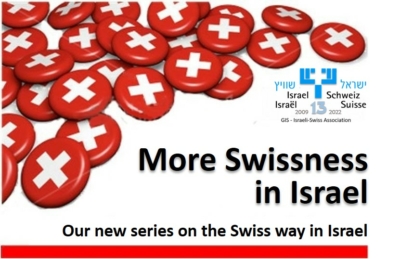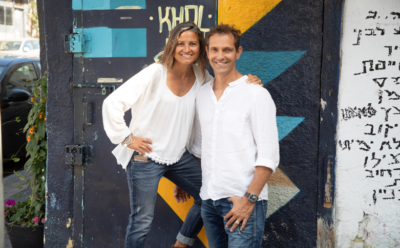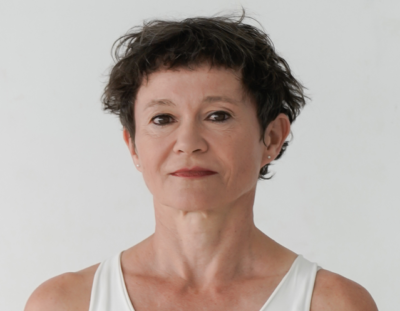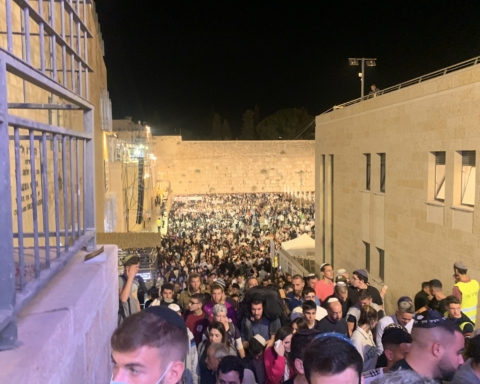
Story By Katharina Hoeftmann Ciobotaru
About 22,000 Swiss citizens live in Israel. We met three of them to talk about their lives, feeling homesick and new paths in another country…
Tabea and Matthias Oppliger
“You live here as if there is no tomorrow”
Actually, Tabea and Matthias Oppliger only wanted to go on a vacation to Tel Aviv. This vacation turned into a whole new life.
When the Swiss couple visited the run-down south of Tel Aviv for the first time in 2012, they were shocked: “At that time, many refugees from Africa had just arrived. I saw a face of Israel there that was unknown and cannot be imagined. A dead prostitute could have been lying in the container in the morning and nobody would have been interested,” recalls 49-year-old Matthias Oppliger. The former detective and his wife Tabea, 45, founded the organization GlowbalAct in Switzerland, which aims to fight human trafficking around the world. Eventually, Tabea and Matthias Oppliger decided to emigrate to Israel with their three children, and because they are all not Jewish, obtaining residence visas and work permits was a much greater challenge.
At the end of August 2014, the Oppligers came to Tel Aviv to set up a so-called social start-up. KitePride employs survivors of human trafficking and prostitution to make functional, one-of-a-kind bags from upcycled kitesurfing kites, sails, parachutes and wetsuits. With every bag sold, jobs are continuously created and the fabric used is saved from being thrown into landfills.
The cultural differences bothered her
Moving to Israel has not always been easy. The cultural differences and the intensity of the people often bothered Tabea Oppliger: “You actually get up and fight right away,” she says. Nevertheless, the family came from the beginning with the aim of staying longer in Israel: “We immediately integrated with the children here completely and fully. It wasn’t that easy at first,” Tabea Oppliger remembers. “We’re not Jewish, and when we came, all the Jewish holidays started. Rosh HaShana, then Yom Kippur. I actually have a good feeling for languages, I speak four languages, but I found Hebrew extremely difficult at first. So I used Google Translate to translate everything for my kids.”

Tabea-und-Matthias-Oppliger Photo Credit: Private
Tabea Oppliger now speaks fluent Hebrew. Their three children, 17, 15 and 12, have fully settled into Israeli life. The family hopes the state will issue them new residency permits when their work visas expire in April 2023. The only thing Tabea Oppliger misses about Switzerland is its efficiency and well-trained staff. But she also believes that her homeland can learn a lot from Israel. “The Israelis are extremely open and approach each other with a special warmth. People live here as if there is no tomorrow. I think it’s great.”
For their company KitePride, the two entrepreneurs hope that they can replicate the concept in other Israeli cities or even other countries. “There are so many people who are on the fringes of society and urgently need this help.”
Further information: Website of the startup KitePride https://kitepride.com/
Gabriel Strenger
“The future of Judaism lies in Israel”
“I grew up as an orthodox Jew in Switzerland. I often had the feeling that there was a kind of glass wall between me and my non-Jewish friends. The fact that I’m returning to Switzerland today as an Israeli and working in dialogue with Christians is like a kind of healing for me,” says the psychologist and speaker on Judaism and spirituality Gabriel Strenger. Strenger, who moved to Israel from Basel after graduating from high school, studied at various yeshivot and universities there and has now lived in Jerusalem for many years, enjoys carrying both cultures within him.
“Israel is my adopted country, but my body is at home in Switzerland. When I get off the plane there, I enjoy the coolness and the fresh air. And I also feel very strongly connected to Swiss values culturally. The Swiss democracy, for example, that’s something I’m proud of.” Nevertheless, it was always clear to the 57-year-old Strenger that he belonged in Israel. In the modern orthodox house in which he grew up, Zionism was taken for granted, so his mother began many sentences with the words like: “When we are in Israel…”. Young Gabriel was active in the Bnei Akiva youth league in Basel and went to the famous yeshiva in Montreux at the age of 15, but it was always clear that he would eventually go to Israel.
He did so in 1984 to begin studying at Bar Ilan University. “I love the directness of the people in Israel, that there are no fake smiles and it’s easy to strike up a conversation with people on the street. The downside is definitely a lack of politeness. And I miss German-language television. I mean, in Germany there is a show like the Literary Quartet, book connoisseurs sit there and discuss literature and people watch it because they find literature important enough. Something like that is unthinkable in Israel,” explains the multiple book author.

Thanks to his work, Strenger still spends a lot of time in Switzerland. He even received a few extremely interesting job offers from his native country, which he always turned down in favor of living in Israel. Strenger, who has five children and is divorced, feels it is a luxury that he can live in Israel but work a lot in Switzerland and Germany. Nevertheless, the center of his life will always be in Israel: “I understand Zionism as actively helping to shape the future of Israel. We Jews should not wait passively for salvation from above, but actively influence our destiny. In my view, the future of Judaism lies only in Israel.”
Gabriel Strenger is one of the protagonists in the new documentary “Wo ist Gott” (Where is God), which will be shown beginning December.
Further information: Website Gabriel Strenger https://www.gabriel-strenger.com
Gabrielle Neuhaus
“I still say today that I am Swiss”
Dancer and actress Gabrielle Neuhaus came to Israel for love more than 30 years ago. Originally from Biel/Bienne, Neuhaus studied dance in Belgium, London and Paris and worked there and in Switzerland. In Israel, the artist was tasked with having to start all over again professionally. “At that time there were few professional dance theaters in Israel, plus I was pregnant and that’s not exactly easy as a dancer either.”
30 years later, Neuhaus has established a presence in the country through many different projects. She writes and works in Hebrew, showing her projects on many different stages around the country. Her documentary performance “Stand by” was recently shown at the Akko Festival, for which she interviewed women who, like her, came to Israel for love. “I asked the women, some of whom also live in Arab society, what they knew about Israel beforehand. And how they felt here at the beginning and how it is today. The reactions are very different: some absolutely love it, others hate it.”
Neuhaus’s relationship with Israel is still complicated to this day. When she separated from the Israeli father of her two daughters ten years ago, she knew that she didn’t want to go back to Switzerland: “I was 50 at the time and finally settled here. I couldn’t start all over again.” At the time, however, she decided that something had to change in her relationship with Israel. “I thought to myself, if I stay here, then I’ll have to take responsibility. I can no longer hide behind my husband and say I only live here because of him.” Neuhaus began to learn Arabic in order to engage more with this part of Israeli society.
What she loves about Israel is its energy
What she still loves about Israel today is its energy and the fact that you can always reinvent yourself. “It is more spontaneous, more flexible, faster here. And decisions are implemented immediately.” Nevertheless, she is currently flirting with the idea of returning to Switzerland after all. “I still say today that I am Swiss and have an Israeli passport. I’ve never felt like an Israeli.”
For her “Stand by” project, she now also wants to go to Switzerland to talk to women who have come to the country for their partner. “Maybe I’m nostalgic when I think back to everything I love about Switzerland. The punctuality, the modesty, really listening to each other. Maybe Switzerland hasn’t been like this for a long time. But I want to at least feel whether I still fit in there.”

Further information: Website Gabrielle Neuhaus https://www.gabrielleneuhaus.com








